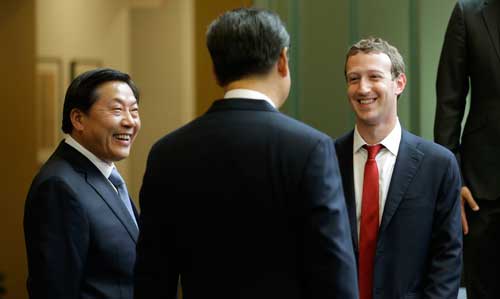When the new director of the Cyberspace Administration of China, Xu Lin, issued on July 3 a warning that websites not report unverified content drawn from social media without facing possible punishment, it was clear that Beijing would move quickly beyond the Lu Wei era of information control. The announcement demanded that news websites provide “correct guidance for public opinion”–correct, clearly, in the eyes of the Cyberspace Administration, and ultimately the Chinese Communist Party. The warnings suggest that the harsh controls implemented by Lu could become even more severe.
A free press has never been part of the tradition of the Party, although through its 66 years in power, the freedom granted to the media has varied widely, with periods of relative openness sometimes followed by a harsh crackdown. Party Chairman Mao Zedong set the pattern himself when, in 1956, a Hundred Flowers Campaign that encouraged criticism of the government was followed by the harsh Anti-Rightest Campaign of 1957. Many thought the initial campaign was a ruse aimed at drawing out regime opponents.
Lu Wei headed the Cyberspace Administration, a powerful, newly created censorship agency at the center of Chinese political power, from 2014 until he left the post at the end of June. Lu had taken over the less powerful State Internet Information office in 2013. In his new position, he faced the challenge of setting constantly changing boundaries for the acceptable expression of opinion, while at the same time coping with a vastly expanded media environment, in which every Chinese citizen with a computer or cell phone – now over 700,000 million – had easy ways to sound off through popular social media channels like Weibo or WeChat. Lu was a blustery, charismatic figure, according to press reports, who evangelized for national, sovereign web control around the world, proselytizing unapologetically for the strictures on free expression placed on the Chinese people. “Only through my own proper management of my own internet, [and] your proper management of your own internet . . . can the online space be truly safe, more orderly and more beautiful,” Lu told foreign guests at a Chinese New Year banquet, according to the China Media Project.
He reflected the aggressive nationalism and can-do spirit of Chinese President Xi Jinping. “Lu’s work has been consistent with the more assertive self-confident style of the administration as a whole under Xi,” Columbia University Professor Andrew Nathan told CPJ. Seeing America and Europe as has-been powers, with China on the rise, Xi and Lu believe, said Nathan, that “History does not bend to the will of those who are patient and cautious; it bends to the will of those who are strong.” As a result, much as China has alarmed neighbors by building artificial islands in the South China Sea to cement its territorial claims, Lu was unafraid to use the power of the Chinese market to thwart internet giants like Google or Facebook in order to maintain control through Chinese companies, and to box in and squeeze technology from industry leaders like Microsoft or Qualcomm in order to foster strong local technology companies.
Lu also used the coercive power of the state to bring Chinese to heel. His people did not just censor and delete offending postings, but, working with police, arrested and imprisoned the posters for vague offenses such as “picking quarrels and provoking trouble,” or the more serious crime of “subversion.” “He did have a big impact, especially in 2013 and 2014, at the height of the crackdown,” said Xiao Qiang, founder and editor-in-chief of the China Digital Times, a California-based news website. As China’s economy slowed, potentially undermining a chief source of regime legitimacy, areas of public discussion and reporting once tolerated, such as criticism of economic policy, have been rolled back. In August 2015, police arrested and forced a public apology from the financial reporter Wang Xiaolu, of Caijing magazine, for reporting on government deliberations in response to the gyrating stock market.
Still, it’s unclear whether Lu’s departure from the Cyberspace Administration amounts to a sacking, or preparation for a promotion. His departure from the Administration was announced without explanation or comment. “It’s easy to see he did a lot for the government, but difficult to say he has succeeded,” said Xiao. That, Xiao said, is because online voices challenging the government have grown stronger since the end of last year, even as the crackdown has proceeded. “It’s one indicator of how much the government has actually failed,” he said.
The new director of the administration, Xu Lin, was Lu’s deputy, and previously ran the propaganda department of Shanghai. He worked directly under President Xi when Xi was the Shanghai party secretary in 2007, and the two are believed to be close.
While visiting Beijing on July 7, U.N. Secretary General Ban Ki-moon told Chinese leaders in a press conference that a free media was one of the keys to China’s future development, a view strongly held at CPJ. He said that a free and independent media helped to assure accountability, thereby improving the government’s image in the eyes of its people. Chinese leaders seem to believe that China can succeed in the information age while severely restricting the free flow of information, a dubious proposition at best.
Xiao expects the crackdown on free expression in China to intensify in the months ahead, while warning that “government censorship has become very unpopular.” It’s a battle that promises to play out over a long period of time.
